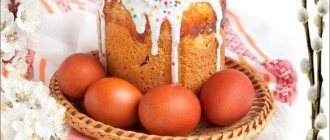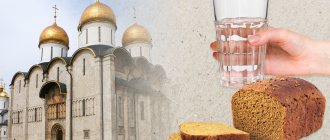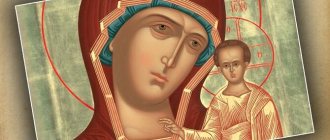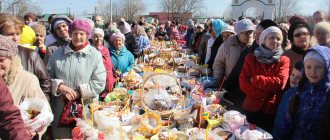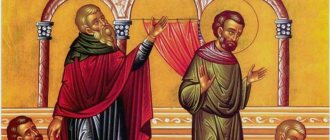Even if you don’t think about Orthodox traditions and holidays, but still celebrate the most famous church holidays, this post is for you. This year there have already been big holidays, these are Christmas, Epiphany, Candlemas. But the most famous dates await us. The end of February will be marked by the onset of Maslenitsa, it will be celebrated from February 28 to March 6, this week the Orthodox are preparing for Lent, which will begin on March 7. This week people bake pancakes with various fillings and visit relatives and friends. We will touch on this tradition much later, but now I want to tell you what holidays await us throughout the year, how and when to fast, when to remember loved ones, and we will also consider other questions that ordinary people most often ask.
weeks in which there is no fast on Wednesday and Friday
January 7 - 18 - Christmastide
February 14 - 19 ‒ The Publican and the Pharisee
February 28 - March 6 ‒ Maslenitsa
April 25 - 30 ‒ Easter week
June 13 - 19 - Trinity Week
calendar schedule of Orthodox holidays
Types of weeks
Work as a courier at Yandex.Eda (up to 3,400 rubles per shift) leave a request →
How many times a year can you allow yourself to “relax” with regard to food prohibitions? Below you will find out what holidays such a week occurs on, as well as how these holidays are celebrated.
Holy Week
The first week of the year covers not 7, but 11 days, starting from January 7 (ending the Nativity fast), and lasts until the feast of the Epiphany - January 18. This week symbolizes the great significance of the holiday - the day when Holy Mary revealed its Savior to the world . The fast preceding the celebration of the Nativity of Christ initially lasted 7 days, but later at the Council it was established that its duration should be equal to the duration of Great Lent, that is, 40 days.
In ancient times, on such days it was forbidden to get married or genuflect.
Week of the Publican and Pharisee
This seven-day period is named after the parable of the same name, which talks about the need to be humble , which is the role the Publican took on in the parable, putting an end to his pride, which, in turn, was resorted to by the Pharisee.
The week does not have a specific date, since it is tied to the Easter holiday, but, as a rule, it falls a week 14 days before the start of Lent.
Week of the Prodigal Son
It follows the Week of the Publican and the Pharisee. Probably everyone has heard at least something about this parable, perhaps even an unbeliever.
Become a courier of the Yandex.Food service right now (up to 3,400 rubles per shift) leave a request →
She talks about a son who left home with what his father gave him and skipped the rest of it. Then he returned to his father's house and begged for forgiveness from his father, who forgave his unlucky son. This week everyone should repent of their sins, trusting in the mercy of God.
Week of the Last Judgment
In this week, after which the turn of Great Lent comes, everyone who has passed on to another world is remembered, even those who are not inveterate. This is indicated by the parable read at the liturgies this week. It is worth thinking these days that the Lord is not only merciful, but also fair.
Maslenitsa
This holiday of welcoming spring has taken root with us since the times of paganism and merged with the last week, also called “cheese week,” before the forty-eight-day fast. But in this period there is one “but” - eating meat products is already prohibited, but eggs, dairy and fish foods are allowed. But why can’t you eat only meat? The Church Charter includes such a rule in honor of the victory of the Byzantine Emperor Heraclius I over the Persians, who during the war vowed not to eat meat for a week before Lent.
Maslenitsa is conventionally divided into narrow and wide. In the first half of the week there is a narrow one, when it is allowed to do housework, and from Thursday, when the wide Maslenitsa comes into force, all work stops.
Throughout the week, it is forbidden to drink alcoholic beverages or be influenced by negativity and bad mood. The home must be cleaned, otherwise the mess will accompany you throughout the year. Traditionally, this period is celebrated with pancakes, which are served to household members and guests. The week ends with Forgiveness Sunday, when you should forgive all insults to others and ask for forgiveness from your loved ones.
About the author About the book
This time should be devoted to getting closer to family and friends.
Bright Week
Comes immediately after the Great Easter holiday. The Resurrection of Christ is supposed to be celebrated for another 40 days, so this week is a natural continuation of this celebration. This is a time of joy and fun. Throughout the first week, Jesus Christ met with his followers and with his appearance proved that a miracle had happened - the Resurrection. Remember “Doubting Thomas”, how can people talk about someone who refuses to believe the rest? This Thomas in history is an apostle who did not believe that the Lord had risen until he saw not only Him himself, but also his wounds.
The Easter holiday begins from Saturday to Sunday and is marked by the Easter service in the church, where parishioners begin to gather at night. The symbols of the holiday are colored eggs, which previously were only red and meant the rebirth of Jesus Christ to a new life through his bloodshed, as well as Easter or Easter cake - tall bread made from butter dough with raisins, like the body of the Lord, to which Christians partake.
Kneeling, fasting and ascetic exercises are strictly prohibited at this time.
Trinity Week
The well-known Feast of the Holy Trinity according to the calendar falls on the fiftieth day after Easter, therefore it is otherwise called Pentecost, as well as the Birthday of the Church. According to the biblical description, on this day the Holy Spirit, taking the form of tongues of fire, appeared before the apostles and gave them the knowledge of other languages and other wonderful gifts; the Bible counts 9 of them in total. The Holy Spirit made it possible for true believers to attract others to the Church so that they could also gain faith. After this event, the apostles noticed that they were able to heal people and prophesy.
Our Slavic ancestors began to celebrate Trinity only 300 years after the baptism of Rus'. The service in the church on this day is accompanied by the Divine Liturgy and Great Vespers. Churches on Trinity are decorated with greenery, and parishioners take birch branches with them to church to be blessed, and subsequently place them at home near icons, thereby protecting themselves and their homes from all evil. In the old days, on this day, people held round dances in the evening, danced and sang songs. It was considered a good omen to make a match if, moreover, after that they had a wedding on Pokrov - this signified a happy married life.
Before the holiday, people clean the house, and on Parents' Saturday they visit cemeteries and remember the dead. Trinity Week begins the day after the celebration. The week lasts until the beginning of Petrov or otherwise the Apostolic Fast, which, in turn, ends on July 12 - on Peter and Paul.
- How to fast on Wednesdays and Fridays;
- See the rules for baptizing a child here;
- How to properly fast before Easter - .
What is a continuous week?
A continuous week is the week from Monday to Sunday, when even weekly fasts on Wednesday and Friday are canceled, and it is allowed to eat any food.
Such weeks are often preparatory to the 4 main Lents (Great, Petrov, Dormition and Nativity) and are tied to church holidays.
Trinity Week
from May 28 to June 3. In some ways, this week has long been reminiscent of Christmastide - it preserved many pagan rituals associated with fortune telling, mermaids, and the other world. The fact is that it has absorbed many pagan traditions that are associated with such a holiday as Semik. With the advent of Orthodoxy, this holiday began to depend on the Trinity, which occurs on the 50th day after Easter (its other name is Pentecost), but its content remained pagan. The symbol of this week is the birch tree. This continuous week is even called “green week”, because not only churches, but also houses are decorated with birch branches and grass, and girls put on wreaths. The day following Trinity is called Spiritual Day and is dedicated to the Holy Spirit. After this week, Peter's fast begins.
We figured out what a continuous week means. This is a week completely devoid of fasting days. So, now it has become very clear what it is. The days of continuous weeks allow you to gain strength before a difficult and long fast or restore them after it; they bring into life not only a varied diet, but also a cheerful atmosphere of celebration.
What you can and cannot do on Bright Week
Bright Week is a period of joy. Before Easter there was a fast, introducing strict restrictions and prohibitions on fun and any entertainment. This week they are removed for Orthodox Christians, so you can unwind. During this period, you should try to visit temples and churches more often due to holiday services; the laity should better try to have time to confess and receive communion.
You cannot be sad or despondent at this time, and this recommendation applies not only to thoughts, but also to actions. If there is anxiety lurking in your soul, you need to have a sincere conversation with a clergyman to find out what is wrong with your soul. During this period, the church imposes a ban on prayers for the dead, but it is lifted if the person died during this time. Funerals and funeral services are always held.
Bright Week is a festive time, so every person can rejoice and have fun, but while doing this, one must try to scatter goodness around oneself. If such a celebration disturbs anyone, he must be humbled, trying to be quieter. The main thing is to understand that Easter and the first week after it are a time of celebrating the triumph of life over death and good over evil.
The meaning of posts
Fasting in the Orthodox faith is a time that is specifically intended for self-analysis. During this time, believers read deep prayers and perform religious deeds, which are characterized by reading scriptures and giving alms.
The best article for you, go to: Baptismal name, Orthodox church names
At the gastronomic level, fasting involves abstaining from certain types of food. During the strictest fast, it is not recommended to consume food of animal origin and vegetable oil.
In Orthodoxy there are only four main posts:
- Christmas,
- Petrovsky,
- Uspensky.
- Great.
In addition to the main posts, there are also additional ones. They imply abstinence from certain types of food, a Lenten menu for Wednesday and Friday. It is also very important to perform the rite of communion on these days.
How to take communion after Easter on Bright Week
Taking communion on Bright Week is allowed and even recommended; this is stated in the rules of the Ecumenical Council. These recommendations advise the laity to undergo the ritual daily during the week after Easter. Now this is impossible, so within 7 days you need to find at least one and have time to attend the service.
If a Christian has spent the entire period of Lent in prayer and complete abstinence from impurity, gluttony and adultery, it is advised to take communion on an empty stomach, but without fasting on Easter. At Matins on Monday after Easter, before the liturgy, the Paschal canon of the hours of Easter and the Follow-up to Communion is read. It is not necessary to receive communion on Holy Week. The main thing is that the parishioner should not have serious sins without repentance.
Attention!
The need for confession before communion is determined by the parish confessor. If the clergyman considers this process necessary, one should not insist otherwise.
Bright Week is the seven days following the main Orthodox holiday of Easter. Each of them has its own significance in the Orthodox Church. Each date, as well as the days of Holy Week, has its own explanations - the commandments state exactly how lay believers should spend this day. The main thing at this time is to be in an exalted mood; one must rejoice in the victory of Jesus in the darkness, while not being carried away by earthly sins. This is the best period for confession before the Lord and communion.
Easter week
In 2022, Easter will come on April 8, and the following Bright Week, or Easter Week, will last from April 9 to 15. Easter is celebrated on the first Sunday after the spring full moon, so it falls on a different date every year. Its celebration also determines the dates of the preceding Great Lent and the two continuous weeks described above. What is Easter for Orthodox Christians? Holiday of Holidays! It is difficult to imagine what joy and what depth the news of the Resurrection contains. Christ the conqueror seems to show us that death no longer exists. Everyone who has lost their loved ones believes in their resurrection in the distant future, everyone who will soon leave this world looks forward more boldly. Atonement for human sins has been accomplished. All that is difficult and painful is behind us - both the suffering of Christ and the strict restrictions that the Orthodox endured throughout Lent, remembering His sacrifice. Therefore, Easter week is always bright and joyful. Every day a procession of the cross takes place in the churches, and the bells ring merrily. For several days, people eat food consecrated on Holy Saturday for breakfast - Easter cakes, eggs. It is customary to spend these days in a joyful, high spirits and do good deeds.
